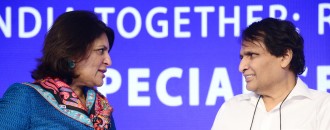
‘Level-playing tax policies need of the hour for MSMEs’
Execution of GST will put an end to complex taxation practices reducing transaction costs and making the system tax-payer friendly for MSMEs, says Confederation of Indian Industry Sai Nikesh | The Dollar Business
 CII recommends reduction of Central Sales Tax (CST) rate to 1% till GST is implemented
CII recommends reduction of Central Sales Tax (CST) rate to 1% till GST is implementedIn line with government’s initiatives aimed at improving manufacturing activity in the country, the Indian industry has been keen on promoting Micro Small and Medium Enterprises (MSMEs), which form the core part of any industry. In this regard, various industry bodies have been pitching on the need to extend incentive and skill-based support to small-scale industries. Ahead of Union Budget 2016-17 release on Monday, the apex industry body- Confederation of Indian Industry (CII)’s MSME Development Council shared with The Dollar Business, its key expectations from the Budget for MSMEs in specific, wherein it covered various issues pertaining to taxation mechanism, duty structure, investment in new plant & machinery, among others. Stating that Goods and Service Tax (GST) would be a critical step in favour of MSMEs, CII urged the Centre to lay a clear roadmap for implementation of the same. “Adequate time line shall also be established for GST assessments and implementation.” Exuding confidence that ‘execution of GST will put an end to complex taxation practices reducing transaction costs and making the system tax-payer friendly for MSMEs,’ it urged the Centre to take an additional care to ensure that ‘State GST laws do not override the Central GST rules in terms of compliance and concessions’. Stating that ‘Partial Reverse Charge’ mechanism has created lot of complication for small organizations, it sought for ‘abolition of the same in case of Service Tax’. “Custom duty on raw materials is higher than import duty charged on the finished product,” it pointed out and recommended various associations to give a list of items with no dual use – but with inverted duty structure, before CBEC examines the matter for appropriate rectification. “There shall be restriction for Special Additional Duty (SAD) levy in case of small importers, as claiming refund is costlier than the refund amount due to excessive documentation, administration and certification. In this regard, it recommended the Centre to fix the threshold limit for SAD levy below Rs.50 lakh of import consignment.” CII pitched for simpler Central Value Added Tax (CENVAT) credit rules, reduction of Central Sales Tax (CST) rate to 1% till GST is implemented, relaxation of penalty provision for late-compliance of Indirect Taxes Returns, extension of timeline for Service Tax Returns via online mode, were among other recommendations to ease processes for MSMEs under indirect tax. With respect to direct taxes, CII recommended ‘Non-Banking Financial Companies (NBFCs) (including those accorded Public Financial Institution status) should be treated at par with banks and should be extended with the benefit of ‘Nil Tax Deduction at Source (TDS)’ under Sec. 194A of Income Tax, which provides for TDS at the rate of 10% on payment of interest (excluding interest on securities) to a resident. For the rule under section 32AC of Finance Act, 2013, which needs a ‘qualifying asset to be acquired and also installed in the very same year’ for gaining incentives, the CII recommended the allowance of incentive in the same year of installation of Plant & Machinery & completion of building and not on the basis of ‘acquisition and installation’. “To provide more incentive for exports, we recommend for consideration that export turnover/ profit deduction for MSMEs may be introduced for a limited fixed period of 5 years viz. till 2021-22. Alternatively, a differential tax regime for MSME exports may be considered with exports profit being taxed at a lower rate of 5 to 10%,” the CII recommended. Stating that tax policies for MSMEs should allow a level playing field and ensure ease of doing business environment, the apex industry body recommended ‘Special Preferential Rates’ for MSMEs to reduce cost of doing business and promote entrepreneurship, which will further boost MSMEs contribution to GDP. To ensure free capital flow, CII recommended removal of Dividend Distribution Tax (DDT) and reduction of Basic Tax rates to non-corporate in line with proposal for rate reduction to corporates. To ease financial access, making adequate, timely and affordable credit is the top imperative to assist MSMEs embark on a high growth path. CII recommended relaxation of ‘Domestic Transfer Pricing’ mechanism to release additional burden on MSMEs alongside specific relaxation to start ups in case of Advance Tax, Quarterly TDS compliance, Presumptive Taxation during struggling stage without tax audit, Elimination of MAT/AMT and simplification of business losses rules. Enhancement of limits under the Credit Guarantee Trust for Micro and Small Enterprises (CGTMSE) scheme from the present Rs.4,000 crore to Rs.28,000 crore annually over the next 5 years, classification of Non-Performing Assets (NPAs) to 120 days instead of the present 90 days with a special dispensation for extra 30 days for MSMEs, 25% of reserved fund allocations for women entrepreneurs and incentives to large enterprises and PSUs to make timely payments, are among other measures recommended under financial support for MSMEs.
February 27, 2016 | 5:13pm IST.





 to success.
to success.